||| FROM KRISS KEVORKIAN for LEGAL RIGHTS FOR THE SALISH SEA |||
Gig Harbor, WA (December 13th, 2022)—Yesterday evening, Gig Harbor’s Mayor Tracie Markley signed a Proclamation describing the City of Gig Harbor’s support for action by local, state, federal and tribal governments that secure and effectuate the inherent rights of the Southern Resident Orcas. This Proclamation comes a week after the City of Port Townsend became the first city in Washington State to do so.
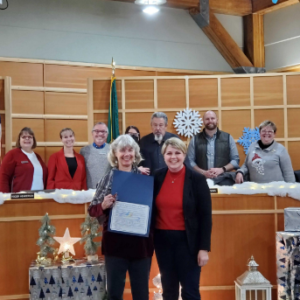
Twila Slind and Mayor Tracie Markley in front of the Gig Harbor City Council including Jeni Woock on the far right who introduced the proclamation to Mayor Markley.
Twila Slind and Mayor Tracie Markley in front of the Gig Harbor City Council including Jeni Woock on the far right who introduced the proclamation to Mayor Markley. The Southern Resident Orcas (“the Orcas) are culturally, spiritually, and economically important to the people of Washington State and the world. However, despite federal legal protections for nearly two decades, the population continues to decline and is critically endangered, with only 73 individuals left in the wild.
“Our Lhaq’temish term for killer whales is qwe’lhol’mechen, meaning “our relations under the waves.” They are members of our family, and we have a sacred obligation to help heal and protect them. Recognizing our relations’ inherent rights is critical to this work. We are guided by ancestors and our culture, and we appreciate these Proclamations that bring us all together in our shared responsibility to our whale relatives and also to our own future generations.” says Squil-le-he-le, Raynell Morris, Lhaq’temish matriarch and Lummi Nation tribal member.
Jeni Woock, Gig Harbor City Councilmember shared, “For all my life, I will always remember Tahlequah carrying her dead calf for 17 days. To me, this was a scream for her grief and human help. We must do everything we can to keep our Southern Resident Orcas safe and healthy and humans can do this. The more positive publicity and the more people and cities get involved, the quicker we can get our Orcas help. I was glad to present the proclamation to Mayor Markley and so glad of her strong support.”
Kriss Kevorkian of Legal Rights for the Salish Sea (LRSS), added, “Six years ago, Gig Harbor community members came together to start a grassroots rights of Nature campaign. We had Jeni Woock’s support then, and once she became a City Councilmember, she continued to champion environmental causes. We are grateful that she brought this proclamation to
our mayor, and we appreciate Mayor Markley and the Gig Harbor City Council for taking action to save these unique and critically endangered Orcas.” says Kriss Kevorkian, founder of LRSS.
Twila Slind with LRSS accepted the proclamation and said, “Recognizing the inherent rights of our Southern Resident Orcas is a first step towards reversing their decline.” Legal Rights for the Salish Sea partnered with Earth Law Center (ELC) in 2018, and are leading a campaign to gain support for recognizing the rights of the Orcas at the local and Washington State level.
Legal rights for species and their habitats is not new. Indigenous understandings of our kinship with other beings has existed since time immemorial. Hundreds of Rights of Nature laws exist in approximately 30 countries, with dozens at the local and tribal levels in the United States, including Santa Monica’s Sustainability Rights Ordinance and the Nez Perce’s
resolution recognizing the rights of the Snake River. Both San Francisco and Malibu passed resolutions in 2014 protecting the rights of whales and dolphins in their coastal waters.
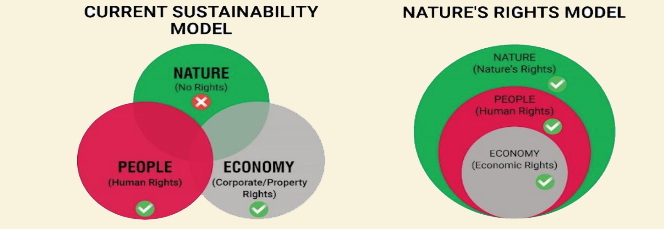
Rather than Nature, the economy and humankind functioning separately, the Rights of Nature framework recognizes that all are dependent and exist within one another. The economy cannot exist 2 separately from society, and society cannot exist separately from Nature. Image Credit: Carducci M, et. al. (2020) Towards an EU Charter of the Fundamental Rights of Nature. Study, Brussels: European Economic and Social Committee; Nature’s Rights Europe.
“While well known environmental laws such as the Endangered Species Act (ESA) have certainly had some beneficial impacts, they have had their limitations. For example, the ESA only kicks in once a species is threatened with extinction rather than seeking to maintain healthy populations before the point of listing… Additionally, in the past few years, NOAA
approved a request from the Navy for military exercises that could potentially harm, kill, or “take” 51 Southern Residents per year, and decreased the amount of salmon allocated to the population by one-third.” says Michelle Bender, Ocean Campaigns Director at Earth Law Center. “Environmental laws should mean protecting the environment through
compromise; compromise for an equitable and healthy future for all of Nature, of which we are a part of. Recognizing inherent rights does not automatically mean no whale watching or fishing, but it does mean a hard look and re-evaluation of human activity and the way we do business. We can either continue business as usual and entire ecosystems will collapse, leaving us without the industries we cherish anyway, or reduce our impact and proactively restore ecosystems now to ensure such industries that contribute to our livelihood still exist 30, 50 and 100 years from now.”
“As a Washingtonian, I am so proud to see cities in our state taking action on behalf of our Southern Resident Orcas. This is the first step in changing the trajectory of the decline of this iconic species here in the Salish Sea,” says Linda Evans, actress and activist. “Recognizing the Southern Residents’ legal rights means that we must consider their wellbeing and needs in addition to human interests in decision making, and that they will have a voice in a variety of forums, including courts. One way that could be done is through human guardians acting on their behalf and in their best interests,,” explained Elizabeth Dunne, ELC’s Director of Legal Advocacy. “When structures such as the lower Snake River dams interfere with the Southern Residents’ ability to obtain prey (salmon) crucial for their survival, then to realize their rights we must find solutions to remedy the problem,” said Dunne.
This effort is also supported by an online change.org petition and declaration of understanding, of which over 10 organizations have signed onto. Earth Law Center created a toolkit to help advocates introduce a resolution to their local
communities, share the campaign on social media and other helpful talking points. You can take action and view the toolkit here.
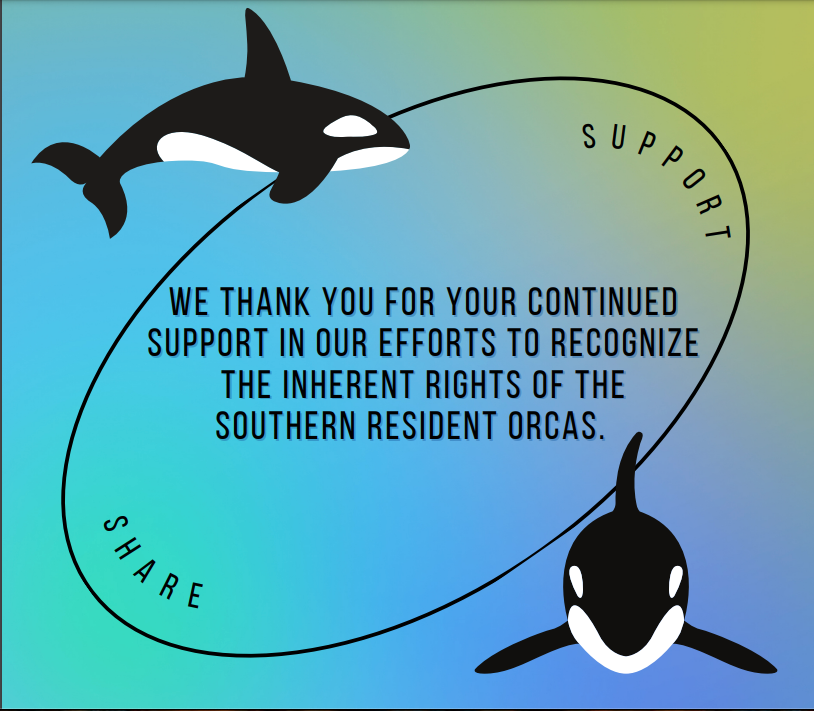
Earth Law Center (www.earthlawcenter.org) works to transform the law to recognize and protect nature’s inherent rights to exist, thrive and evolve. ELC partners with frontline indigenous people, communities and organizations to challenge the overarching legal and economic systems that reward environmental harm, and advance governance systems that maximize social and ecological well-being.
Legal Rights for the Salish Sea (LRSS- http://legalrightsforthesalishsea.org/ is a local community group based in Gig Harbor, WA, founded by Dr. Kriss Kevorkian, educating people to recognize the inherent rights of the Southern Resident Orcas. Under our current legal system humans and corporations have legal standing but animals and ecosystems don’t. We believe that animals and ecosystems should also have legal rights, not just protections that can be changed by different administrations.
**If you are reading theOrcasonian for free, thank your fellow islanders. If you would like to support theOrcasonian CLICK HERE to set your modestly-priced, voluntary subscription. Otherwise, no worries; we’re happy to share with you.**

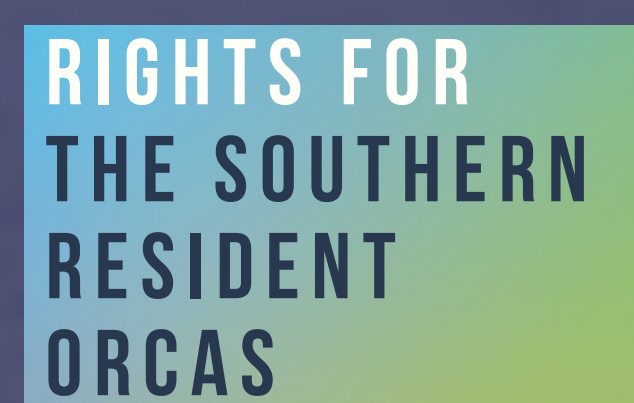


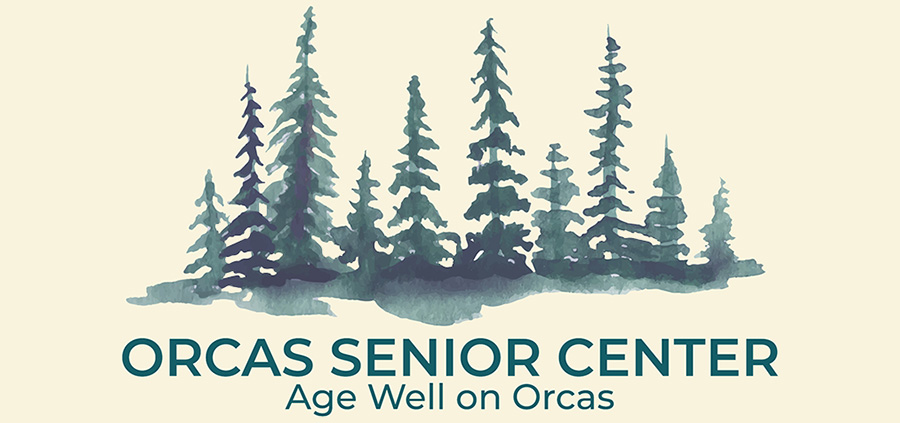
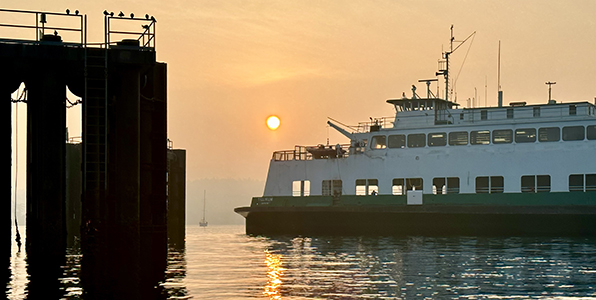
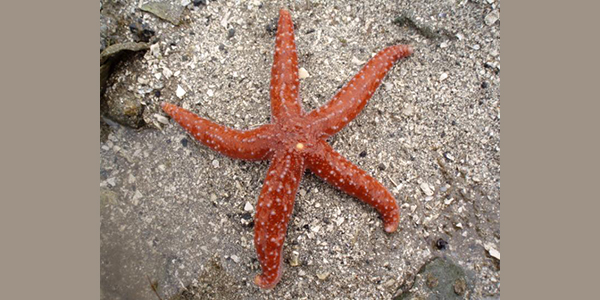


I could write volumes-but it all come down to two words: Thank You.
I would have used a different diagram: The Economy surrounding People surrounding Nature. The Economy does not repay Nature for what it extracts, demanded by People. But the laws of Economics, being products of variable human imagination cannot prevail against the immutable laws of physics, biology and chemistry. T